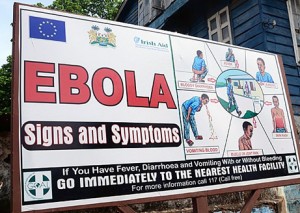Upper East House of Chiefs strategizes for prevention of Ebola
 The Upper East Regional House of Chiefs has started discussing plans to re-position itself and the various communities against Ebola and other public health risks.
The Upper East Regional House of Chiefs has started discussing plans to re-position itself and the various communities against Ebola and other public health risks.
Among other things, the chiefs are reconsidering reviewing burial procedures, funeral performances and other traditional practices that have the tendency to spread diseases.
The chiefs would also intensify public education to create awareness of communicable and non-communicable diseases and how to prevent them.
The plans were ignited during a workshop sponsored by Konrad-Adeneur-Stifung (KAS) in partnership with the Ministry of Health/Public Health Directorate for Traditional authorities on the state of Ebola and the role of traditional authority in Public Health Crisis, and lessons from the Ebola crisis in West Africa.
Dr Isaac Owusu Mensah, Programme Manager, Konrad-Adeneur-Stifung (KAS), acknowledged the importance of the workshop, and said his outfit supported issues of politics and governance, and could not have done better if communities were devastated with diseases and deaths in the wake of EBOLA and public health risks.
“Without health no one can talk about issues of politics, governance and development”, Dr Mensah stressed, saying the location of the region bordered by neighbouring countries, Burkina Faso and Togo, was a cause for concern.
Dr Kofi Bonney, an Immunologist of the Noguchi Memorial Research Institute, University of Ghana, said though Ghana recorded no case of the disease, there was the need for stringent measures to be taken to prevent its entry through the borders of the country, since the mode of spread was through skin contact.
He noted that out of a total of 28,000 infected people in the recent epidemic, 11,000 people died, and said case fatality rate of the disease was 90 per cent.
Dr Philip Amoo, Head of Public Health at the Korle-Bu Teaching Hospital, in a presentation on the role of traditional leaders, said chiefs were key in the partnership because of their legitimacy and credibility.
In that regard, he noted that chiefs could serve as role models, advocates and mobilizers during disease outbreak and natural disasters and all other public health crises.
He urged chiefs to change their orientation in the face of lessons learnt from Ebola, and put in measures to avoid it in the region since their voices are non- negotiable.
Naba Sugri Bewong, President of the Regional House of Chiefs, and paramount chief of Sekoti traditional area, thanked the organizers for the programme, and appealed to his colleagues to champion the course.
He advocated for changes in burial practices such as burying at home and opening of old graves for fresh corpses to be buried, saying such practices had to be reviewed, and proposed the creation of cemeteries in all communities.
Source: GNA
